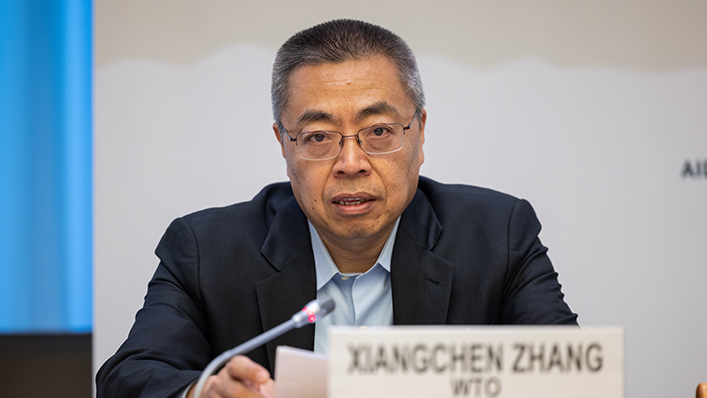
Excellencies,
Ladies and gentlemen,
Trade can be a powerful force for change. Our Director General, Dr. Ngozi Okonjo-Iweala, has reiterated several times that trade, and the WTO, are part of the solution to climate change and environmental degradation.
Climate change is one of the most pressing challenges of our time. The World Bank estimates that natural disasters already cost low- and middle-income countries $390 billion per year in damage related to water, transport, and power infrastructure.
In that context, adapting to climate change by reducing climate-related risks and vulnerability is a key economic strategy. International trade can contribute to climate change adaptation efforts by enhancing economic resilience to extreme weather events through diversified supply chains, timely provision of essential good and service, improved food security, and greater access to climate-related adaptation technologies.
Reducing greenhouse gases emissions that contribute to climate change is also essential. The transition to a low-carbon economy entails a substantive transformation of energy, production, transport and land-use systems. While climate change mitigation measures may incur short-term economic costs and cause short-term job losses, a just transition to a more sustainable economy offers much potential.
The International Energy Agency estimates that meeting Paris Agreement targets would require annual clean energy investments to triple to 4 trillion USD by 2030. Ensuring sustainable infrastructure will be a critical determinant of future growth and prosperity. A green transition also brings employment opportunities: ILO estimates that 24 million jobs worldwide could be created by the green economy by 2030, a net increase of 18 million.
Open trade plays a critical role in providing affordable access to advanced technologies needed to transition to a low-carbon economy. Lowering barriers to trade in environmental goods and services helps facilitate transfer and deployment of climate change mitigation and adaptation technologies.
85% of Members who responded to 2022 WTO-OECD Aid for Trade Monitoring and Evaluation questionnaire observed that their domestic trade objectives address environmental concerns. This shows a resolve among the Membership to use trade as a tool for sustainable development. We must facilitate this process by ensuring Members, especially developing countries and LDCs, have the necessary resources to pursue trade and sustainability objectives.
Aid for trade can play an essential role in channelling the resources to realise a just green transition for developing countries. The Aid for Trade initiative has continued to gather strength, with consistent year on year gains since inception. In sum, more than 556 billion dollars of Aid for Trade has been disbursed globally to address trade-related constraints of developing countries and LDCs. In fact, a record-high disbursement value of 48.7 billion dollars was recorded in 2020. This is despite the uncertainties caused by budgetary constraints and pandemic-led effects over recent years.
What is very interesting to note is that 51% of Aid for Trade commitments made in 2020 include climate-related objectives. A majority of this climate-tagged funding, around 40%, has been allocated for LDCs.
We also see a realignment of aid for trade priorities on a sectoral level. Within the energy sector, which contributes a large share of total Green House Gas emissions, more and more support is being rechannelled to support renewables. Aid for Trade disbursements towards renewable sources increased by 36% between 2019 and 2020. During the same period, the share of disbursements to non-renewable sources actually decreased by 26%.
The WTO Membership has taken active steps to do their part in facilitating a transition to sustainable development. Initiatives such as the Trade and Environmental Sustainability Structured Discussions, the Informal Dialogue on Plastics Pollution and Sustainable Plastics Trade, and the Fossil Fuel Subsidy Reform stand testament to Members’ commitment to bring forth change. The agreement on fisheries subsides, which was agreed upon during the Ministerial Conference last month, is another example of this commitment. The Agreement serves as an indication of Members’ interest in tackling climate and sustainability issues within the framework of the WTO.
Though we see progress in aid for trade, and momentum at the WTO, the rate of change is not enough. We continue to fall short of the 100 billion a year target that we set for climate finance by 2020. There remains a substantial gap between what is required and what has been provisioned. Developing countries and LDCs urgently require support to implement climate-smart infrastructure and recast local production towards sustainability. We are not using the full potential of the multilateral trading system to accelerate the pace of change to adapt to and mitigate climate change.
This is not to say that we have not made advancements. Developing countries and LDCs have taken leadership in many aspects. Several impressive projects in these countries are flag bearers for sustainable development. During this session for instance, you will hear more about The Lake Turkhana Wind Power project from Kenya which makes for a fascinating story.
I hope the discussions that we will be having today pave way for a better understanding of the current state of play. I also hope that the discussions will highlight steps we can take, as an international community, to accelerate the move towards sustainable aid for trade.
Thank you.
Share
Reach us to explore global export and import deals